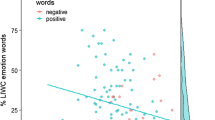Abstract
Prior tests of irrational thinking have included affect words in their irrational idea statements. Thus, because of content similarity, spuriously high correlations may have been previously observed between the endorsement of irrational ideas and self reported affect. A new measure of core irrational ideas, the Personal Beliefs Test, was given to 70 adults between the ages of 17 and 58. Results showed moderate correlations with neuroticism and self-reported negative affect, and a non-significant association with positive affect, thus supporting RET theory. Most of the explained variance in negative affect was related to the endorsement of irrational, Low Frustration Tolerance and Self Worth statements. This suggests that rational emotive therapists might devote greater time to disputing these ideas. Since most studies, including the present one, find only moderate correlations (i.e. .20 to .70) between irrational thinking and negative affect, it seems important to review the hypothesis that such thinking is theprimary cause of emotionality.
Similar content being viewed by others
References
Beck, A. (1976).Cognitive Therapy and the Emotional Disorders. New York: International Universities Press.
Bernard, M. E. Joyce, M. R. (1984).Rational-Emotive Therapy with Children and Adolescents. New York: Wiley
Diener, E. (1984). Subjective well being.Psychological Bulletin, 95, 542–575.
DiGiuseppe, R. & Miller, N. J. (1977). A review of outcome studies on rational emotive psychotherapy. In A. Ellis & R. Grieger R. (Eds.)Handbook of Rational Emotive Therapy (pp. 72–95). New York: Springer.
Ellis, A. (1962).Reason and Emotion in Psychotherapy. New York: Lyle Stuart.
Ellis, A. (1973).Humanistic Psychotherapy: The Rational-Emotive Approach. New York: McGraw Hill.
Jones, R. A. (1968).A factored measure of Ellis' irrational belief system with personality and maladjustment correlates. Unpublished doctoral dissertation, Texas Technical College.
Kassinove, H., Crisci, R., & Tiegerman, S. (1977). Developmental trends in rational thinking: Implications for rational-emotive school mental health programs.Journal of Community Psychology, 5, 266–274.
Lazarus, R. (1984). On the primacy of cognition.American Psychologist, 39, 124–129.
Lipsky, M., Kassinove, H., & Miller, N. (1980). Effects of rational-emotive therapy, rational role reversal, and rational-emotive imagery on the emotional adjustment of community mental health center patients.Journal of Clinical and Counseling Psychology, 48, 366–374.
McGovern, T. E. & Silverman, M. S. (1984). A review of outcome studies of rational emotive-therapy from 1977 to 1982.Journal of Rational Emotive Psychotherapy, 2, 7–18.
Meichenbaum, D. (1977).Cognitive Behavior Modification. New York: Plenum.
Parducci, A. (1968). The relativism of absolute judgements.Scientific American, 219, 84–90.
Rimm, D. C. & Masters, J. C. (1979).Behavior Therapy. New York: Academic Press.
Schwarz, N. & Clore, G. L. (1983). Mood, misattribution, and judgements of well-being: Informative and directive functions of affective states.Journal of Personality and Social Psychology, 45, 513–523.
Smith, T. W. (1982). Irrational beliefs in the cause and treatment of emotional distress: A critical review of the rational emotive model.Clinical Psychology Review, 2, 505–522.
Smith, T. W. (1983). Change in irrational beliefs and the outcome of rationalemotive psychotherapy.Journal of Consulting and Clinical Psychology, 51, 156–157.
Sutton-Simon, K. (1981). Assessing belief systems: Concepts and strategies. In P. C. Kendall & S. D. Hollon (Eds.)Assessment Strategies for Cognitive Behavioral Interventions (pp. 59–84) New York: Academic Press.
Walen, S., DiGiuseppe, R., and Wessler, R. (1980).A Practitioner's Guide to Rational-Emotive Therapy. New York: Oxford.
Wasserman, T. W. (1984). Development of the Children's Dysfunctional Cognition Scale.Child and Family Behavior Therapy, 5, 17–24.
Zajonc, R. (1984). On the primacy of affect.American Psychologist, 39, 117–123.
Author information
Authors and Affiliations
Additional information
He is a Fellow of the Institute for Rational Emotive Therapy and Holds the ABPP diploma in Clinical Psychology.
Copies of the Personal Beliefs Test can be obtained from the author.
Rights and permissions
About this article
Cite this article
Kassinove, H. Self-reported affect and core irrational thinking: A preliminary analysis. J Rational-Emot Cognitive-Behav Ther 4, 119–130 (1986). https://doi.org/10.1007/BF01074170
Issue Date:
DOI: https://doi.org/10.1007/BF01074170



